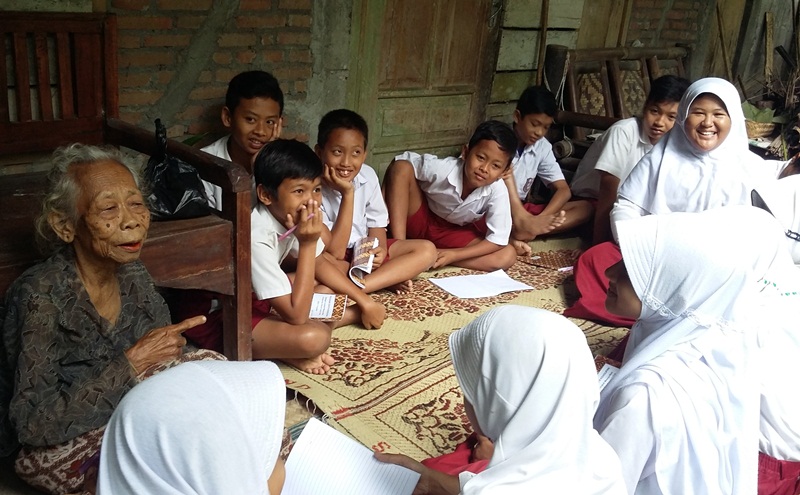The moment of Elementary School Students Learn to Write About Elderly
Tuesday, 03/01/2017Guwosari, Pajangan, BantulJejen Fauzan

The learning group of fifth-grade students at Iroyudan public elementary school, Guwosari, Pajangan, Bantul, appeared happy and curious. That Tuesday morning, December 13, 2016, the Indonesian language teacher and us invited them to study with an elderly named Mbah Girah in Watugedug hamlet, Guwosari. They were curious since it was the first time to learn directly from an elderly person.
Prior to leaving, we just brief them that we will meet and learn with an elderly and please ask her anything. It could be about the name, age, relatives, occupation, and so on as well as observing conditions around the house. If she didn't understand Indonesian, they could ask her in higher-grade Javanese language (Krama Inggil), then wrote down all her stories and their experience after interacting with her as an individual task.
On a mat of stucco floor, on the veranda of Mbah Girah's house, they were scrambled for a place, expecting to be closer to her until finally they could encircle and surround her. Mbah Girah sat in their midst, ready to answer and tell stories in front of them.
They began to ask her alternately: "Mbah, how are you? what is your name?", "How old are you?", "What do you do?", "Whom do you stay with?", "How many children do you have?", "How many siblings do you have?", "How many grandchildren do you have?", etc. But Mbah Girah did not understand the meaning of "work", "have", and some of the questions' vocabularies, and they were confused to find the higher-grade Javanese language of these words.
Finally, they asked the teacher as well as us, feeling that the question has not been answered, some of them repeat the question; "What do you do every day, Mbah?", "How many children do you have?", "Do you have any relatives?", and "Did you ever enroll in school?".
She answered their questions with a long story and quite a loud voice. Only the following questions from them could stop or pause the story. The moments when it came to being pulled like that, she gasped. She forgot the plot for a while and then laughed, revealing the remnants of her brown teeth, made the children laugh at the natural funny granny.
Answering questions about her age, Mbah Girah said that when Indonesia became independent in 1945, she was already a girl, aged 16. "Please add it, until now," she said with a chuckle.
Without waiting for the next question, she also talked about the history of her life during the Japanese colonial period. She said it was very apprehensive at that time, you might go to school but you didn't have books, the clothes you wore were made of gunny sacks that are itchy with lice, eating bran, living in a bamboo house that illuminated by oil lamp at night, and so on. She also told us that her school during the Japanese colonial period was not graduating students since the conditions did not allow it.
A moment later, Mbah Girah talked about “gendis” as a snack in her childhood and the origins of a “sendang” which became the source of life in her village. A child asked, "what are gendis and sendang?". The teacher answered that gendis is candy while sendang is water springs.
So, that morning in the valley, on the veranda of that homely house, behind the valley of the Selarong cave area, smiles and laughter of joy sprout from the fifth-grade elementary school students, also from Mbah Girah. It is a learning simulation from the “Story of Life Program”. After this, they will conduct individual visits and “interviews” with the elderly except their grandparents who are in their environment 3 times in a span of 10 weeks, they were assigned to write down the results.
“The pilot activity was carried out in 3 elementary schools, 2 junior high, and 2 senior high/equivalent in Pajangan District. In addition to providing rewards, we would also work with print media to publish their best writings. At the end of the program, in March or April 2017, we planned to invite all participating schools and stakeholders to present the results of the activities. If it would be successful, we planned to develop similar activities in a wider area,” explained Titis Putri Ambarwati, program coordinator.
According to Titis, it aims to foster respect for the young generation for the elderly and their future learning. It was part of an effort to realize an elderly-friendly community initiated by SurveyMETER Yogyakarta referring to the assessment study results of the elderly-friendly cities of 14 cities in Indonesia conducted in 2013.